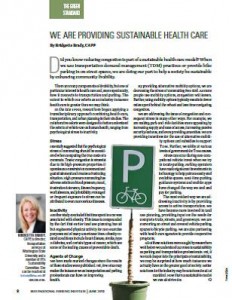Did you know reducing congestion is part of a sustainable health care model? When we use transportation demand management (TDM) practices or provide bike parking in on-street spaces, we are doing our part to help a society be sustainable by enhancing community livability.
There are many components of livability, but one of particular interest is health care and, more specifically, how it connects to transportation and parking. The extent to which our efforts as an industry influence health care is greater than we may think.
In the late 1990s, researchers began applying a transdisciplinary approach combining health care, transportation, and urban planning in their studies. The collaborative efforts were designed to better understand the effects of vehicle use on human health, ranging from psychological stress to inactivity.
Stress
One study suggested that the psychological stress of commuting should be considered when computing the true costs of a commute. Traffic congestion is stressful due to its high-pressure properties: it operates as a constraint on movement and goal attainment and creates a frustrating situation. High-pressure commuting has adverse effects on blood pressure, mood, frustration tolerance, illness frequency, work absences, and job stability. Prolonged or frequent exposure to stress can be attributed to even more serious illnesses.
Inactivity
Another study concluded that time spent in a car was associated with obesity. This issue is compounded by the fact that earlier land use planning has all but engineered physical activity for non-exercise purposes out of many Americans’ lives. Obesity-related conditions include heart disease, stroke, type 2 diabetes, and certain types of cancer, which are some of the leading causes of preventable death.
Agents of Change
We have made marked changes since the results of these studies were published. Yet, few of us may realize the influence we as transportation and parking professionals can have on improving health.
By providing alternative mobility options, we are decreasing the stress of commuting two-fold. As more people use mobility options, congestion will lessen. Further, using mobility options typically results in fewer miles spent behind the wheel and less time navigating congestion.
We are addressing the issue of congestion and consequent stress in many other ways. For example, we are making park-and-ride facilities more appealing by increasing supply and ease of access, increasing passive security features, and even providing amenities. We are providing incentives for the use of alternative mobility options and subsidies to support TDM. Further, we lobby at various levels of government for TDM causes.
Stress can occur during non-occupational vehicle travel when we try to locate parking. Parking operators have made significant investments in technology to help patrons easily find available spaces. Real-time parking guidance systems and mobile apps have changed the way we find and pay for parking.
The most evident way we are addressing inactivity is by providing access to active transportation. We have become more involved in land use planning, providing input on the needs for complete trails, streets, and greenways. We are converting on-street and covered vehicle parking spaces to bicycle parking. We are also partnering with health care agencies to provide cooperative programs.
All of these solutions were sought by researchers well before we understood our roles in sustainability as parking and transportation professionals. Yet, if we look deeper into the principals of sustainability, we may be surprised at how much influence we actually have on the greater good of society. Better solutions for the industry may be solutions for all of mankind. Now that’s a sustainable model we can all strive for.
Bridgette Brady, CAPP, is director, transportation services at Washington State University and a member of IPI’s Sustainability Committee. She can be reached at b.brady@wsu.edu or 509.335.5105.
TPP-2013-06-We are Providing Sustainable Health Care

